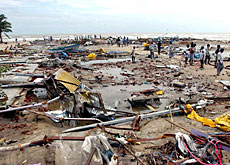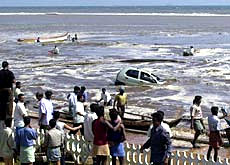Swiss tourists feared dead after earthquake

Several Swiss citizens are believed to have died when tsunamis swept southeast Asia on Sunday, killing at least 27,000 people.
The foreign ministry said on Monday that it had received eyewitness accounts of Swiss victims on the island of Phuket but that it could not confirm the deaths.
At a press conference in Bern, officials said they were still trying to contact around a thousand Swiss citizens in the region, which was rocked by a massive earthquake.
A team of experts has been sent to Thailand to identify possible victims, according to the Swiss abroad’s special ambassador to the foreign ministry, Peter Sutter. Several cases of seriously injured Swiss have also been reported.
The foreign minister, Micheline Calmy-Rey, sent her condolences to the nations affected by the disaster and the families of the victims on Monday.
Swiss tourists
Some 2,200 Swiss tourists were believed to have been travelling in the area, when an earthquake measuring 9.0 on the Richter scale unleashed massive waves on many of the region’s most popular beaches.
Hundreds were evacuated on Monday from hard-hit areas such as the Maldives and Sri Lanka.
The Swiss Air Rescue Service (Rega) has also sent an ambulance helicopter to Phuket, Thailand, to collect at least five wounded Swiss. On board are three medical teams.
The first Swiss tourists arrived back in Zurich on Monday.
Relatives seeking information can call a hotline at the Swiss foreign ministry +41 31 325 33 33.
Swiss officials say local needs are being assessed in Thailand, Sri Lanka and India – the three countries worst affected by the disaster.
Three people from the Swiss Humanitarian Aid Unit – a militia corps made up of relief experts – were also sent to Sri Lanka on Sunday to clarify the situation there.
Emergency aid
In response to the devastation, the Geneva-based Federation of Red Cross and Red Crescent Societies called for an initial SFr7.5 million ($6.6 million) on Monday to assist around 500,000 people affected by the disaster.
The Federation is also sending medical supplies for around 100,000 people in Sri Lanka, where a state of emergency has been declared.
According to the United Nations European headquarters in Geneva, one of the biggest challenges for aid workers over the coming days will be to curb the spread of disease in the midst of clean-up chaos.
“This is perhaps the worst natural disaster in recent history,” said the UN’s emergency relief coordinator, Jan Egeland.
“It touched heavily populated coastlines and very vulnerable communities,” he added.
His comments were echoed by the Federation’s senior health officer, Hakan Sandbladh, who warned of the risk of waterborne diseases, such as malaria and diarrhoea, as well as respiratory tract infections.
Relief
In Switzerland, the government released SFr1 million in emergency funds on Sunday.
A further SFr1 million has been amassed by Swiss charities and NGOs, including the Swiss Red Cross, the church charities Caritas and Heks, as well as World Vision Switzerland and the Workers’ Aid Group.
The charitable arm of the Swiss Broadcasting Corporation, Swiss Solidarity, is also running a nationwide campaign to raise money for the victims of the disaster.
Donations can be made over the internet (see “related links”) and at post offices in Switzerland (account: 10-15000-6).
swissinfo with agencies
An earthquake measuring 9.0 on the Richter scale unleased tsunami waves across southeast Asia on Sunday, killing at least 27,000 people. Tens of thousands are missing.
Sri Lanka, India, Indonesia, Thailand, the Maldives, Malaysia and Myanmar were all hit by the tsunamis.
According to the US Geological Survey, it was the world’s fifth largest quake since 1900 and the largest since the 1964 Prince William Sound, Alaska earthquake.

In compliance with the JTI standards
More: SWI swissinfo.ch certified by the Journalism Trust Initiative










You can find an overview of ongoing debates with our journalists here . Please join us!
If you want to start a conversation about a topic raised in this article or want to report factual errors, email us at english@swissinfo.ch.